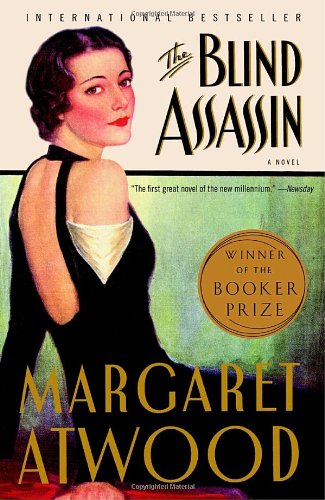Most of us will. We'll choose knowledge no matter what, we'll maim ourselves in the process, we'll stick our hands into the flames for it if necessary. Curiosity is not our only motive: love or grief or despair or hatred is what drives us on. We'll spy relentlessly on the dead: we'll open their letters, we'll read their journals, we'll go through their trash, hoping for a hint, a final word, an explanation, from those who have deserted us -- who've left us holding the bag, which if often a good deal emptier than we'd supposed.
The Blind Assassin has at least five distinct threads: (1) The present-tense, first-person narrative of Iris Chase Griffen, a widow near the end of her life, (2) Iris' past-tense recollections of her early life as the daughter of a wealthy Canadian industrialist, and later as the reluctant wife of Richard Griffen, who temporarily saves her family's button business in exchange for the marriage, (3) a series of dialogues between two unnamed lovers, meeting in secret, (4) a science fiction story called "The Blind Assassin," being composed extemporaneously by the male lover, and (5) a series of newspaper clippings, most of which deal with Iris' sister's Laura's suicide, and the success of her posthumously published novel--The Blind Assassin.
Iris' story is that of a woman caught up in the machinations of cruel and powerful men, isolated by the resentment of her sister and the demands of her husband. At times, Richard and his malicious sinister Winifred are cartoonishly evil, going so far as to institutionalize Laura and, later, separate Iris from her daughter and granddaughter. But the greater moral ambiguity is Iris', reflecting at the end of her life on the fine line between helplessness and complicity:
I thought I could cope with Richard, with Winifred. I could live like a mouse in the castle of the tigers, by creeping around out of sight inside the walls; by staying quiet, by keeping my head down. No: I give myself too much credit. I didn't see the danger. I didn't even know they were tigers. Worse: I didn't know I might become a tiger myself. I didn't know Laura might become one, given the proper circumstances. Anyone might, for that matter.
Atwood controls the narrative with a hand just subtle enough to keep the reader in doubt as to which of the two sisters, Iris or Laura, is the unnamed lover who is the audience for, and sometimes participant in, "The Blind Assassin." Either way, the story is devised mostly by the male, Alex, and the novel attributed to Laura after her suicide is a kind of monument to a love that could never be public or permanent. In it, the titular assassin falls in love with a girl marked for sacrifice, and whose vocal cords have been cut. Of course, these characters are stand-ins for the lovers, themselves maimed, voiceless, and uncertain.
I found myself wanting more of this "novel within a novel," and less of the primary narrative, which struck me as overlong and over-detailed. Atwood invests a lot in her fictional town, Port Ticonderoga*, but the insistent realism she wants it to have was, for me, far less compelling than the fantasy world, Sakiel-Norn. I've only read a handful of Atwood's books, but they seem best when she really allows her imagination to run freely. The narrative of the assassin's escape with the voiceless girl is never really resolved, and though I know that we're meant to understand that either Iris or Laura completes it--the act of writing, as always, is a marker of agency--it left me dissatisfied. Though I enjoyed it, a lot of the novel's energy and attention seemed to me to be misplaced.
*Am I the only one that found the similarity to "Fort Ticonderoga" really distracting?


1 comment:
The structure you're describing (I haven't read it myself) reminds me a bit of The Storyteller. There's a weird fantasy novel within the novel that's being written by one of the characters. At first I found it distracting and disliked those chapters (there are werewolves and vampires - I think English teachers are a little over those things), but then...I succumbed to it and found myself wishing it were its own complete book. I can't imagine the difficulty of creating something so layered and figuring out how to keep it entertaining and purposeful but not take away too much attention from the other plot lines.
Post a Comment